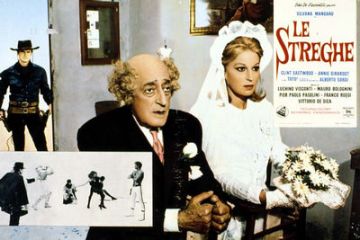It's otiose to try to review the film as a whole, since there isn't
any tangible thematic element that ties the five stories together.
Even the title is a bit misleading, as it only comes to play in the
opening story, and only as the name of a song danced to by Sangano.
For purposes of simplicity, the five stories will be broken down and
remarked upon.
"The Witch Burnt Alive"
After a very long, but visually arresting animated opening credits
sequence, Luchino Visconti (Death in Venice) directs
the first story, which is the longest of the five, taking
approximately a third of the film's running length. Mangano
plays a superstar actress and model who travels to a mountain resort,
only to find the well-to-do inhabitants have prejudices and
preconceived notions about her based on her public persona. The
women are all jealous and the men all want to sleep with her, but all
Mangano wants is to be left alone. It's a mostly somber
satirical piece, but story-wise, it languishes in its modest idea a
bit long, becoming inconsequential to all but those fascinated by the
realities of being famous.
"Community Spirit"
Bolognini's piece isn't really a story. It's more of a visual
gag, in a short segment that features Mangano offering to take an
injured man to a hospital, driving him at breakneck speed throughout
the city, but not stopping at locations where he might find aid.
I won't give away the punchline here, but it succeeds in being
amusing, even if it's the kind of thing that only is interesting the
first time through.
"The Earth Seen from the Moon"
The esteemed writer/director, Pier Paolo Pasolini (Salo),
crafts the middle segment, which is the most artistic and
memorable of the five. Reminiscent in style to "Don Quixote", a
recently widowed father and his son travel around the country in
search of a new wife and mother, and after a long period, they
discover the literally speechless Mangano. She brings joy into
their lives, but they are poor, and in order to find a better life for
themselves, they concoct a scheme to try to make some quick cash.
The story is contrived, and not completely interesting, but the
outlandish performances, artwork, and costumes does evoke great charm
and likeability. Although mute, it's probably the most appealing
of Mangano's five performances, and Toto is terrific.
"The Sicilian"
Franco Rossi directs the fourth an shortest piece, a straight-forward
revenge story that comes and goes before it ever has a chance of
becoming interesting. It's violent, but easily the least
satisfying of the five stories.
"A Night Like Any Other"
Eastwood's appearance is clearly the biggest attraction here, which
was filmed in between the Sergio Leone "Dollars" trilogy. It's
an enjoyable departure from his normal roles, playing a comedic
romantic lead, and he is affably fun to watch. Famed Italian
director, Vittorio de Sica (The Bicycle Thief, Umberto D.)
does a masterful job with the story, which perfectly blends the
mundane and the fantasy in a visually satisfying way. The story
is about a bored housewife (Mangano, of course), who tries in vain to
get her husband to realize that he is not as romantic as he used to
be. The scene is interspersed with comedic romance sequences
revolving around the couple's past romantic interludes, and dreams of
how their lives should be.
Although an interesting experience in parts, The Witches
is only moderately entertaining, only really coming to life in the
third and fifth acts. It's not clear why Mangano is deserving of
such a showcase for her talents, because she has only a modest appeal,
but I suspect her producer husband is the solitary reason behind it.
If you're a fan of Mangano and any of the Italian directors, or are an
Eastwood completist, it might prove to be a worthwhile venture, but
this film will have little appeal to anyone not already looking for
something before going in. For fervent collectors and the
insatiably curious only.

 The
Witches
The
Witches